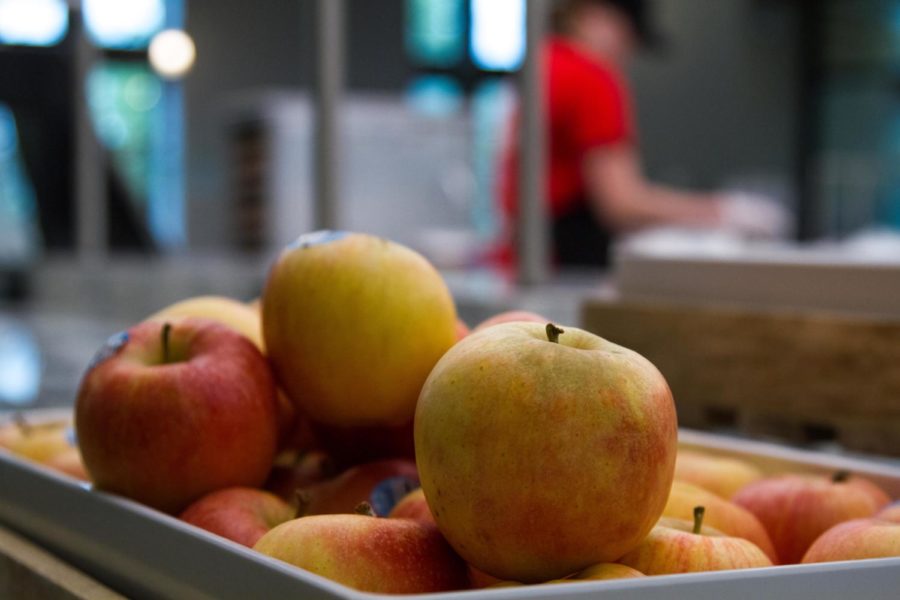Food for thought: How the Iowa State community is fighting financial struggles
September 11, 2018
Imagine a student managing finances, going to class and studying on a daily basis.
Imagine a student doing those things on an empty stomach and without a place to live. That is a reality some students face at Iowa State.
From collaborating with universities across the U.S. to opening a food pantry on campus, Iowa State and the Ames community are working to combat this issue.
Pete Englin, director of residence and vice president for student affairs, said ensuring the success of students is a top priority within student affairs. Coming to Iowa State, many students face numerous challenges. Englin hopes to help students recognize these challenges and work with them to create the best living environment possible.
“We look at if they’re going to graduate or rather, when they’re going to graduate and what are all the obstacles that are in their way,” Englin said. “As students start getting registered and start making choices, we learn that they may not eat or they may not eat well. They may not have places to live at some point… But there’s a lot of ways you can go about addressing and solving housing or food insecurity.”
In 2014, Iowa State started working with the University Innovation Alliance. The alliance, which consists of 11 universities, is committed to increasing the number and diversity of college graduates in the U.S.
The colleges within the alliance focus specifically on graduating low-income students. Since the alliance was formed, participating campuses are producing 25 percent more low-income graduates per year, according to their website.
The University of Texas, which participates in the University Innovation Alliance, recently implemented completion grants and Iowa State followed suit. In the fall of 2017, 60 students from Iowa State received the first completion grants, which erased some debt on their university bill and allowed them to register for their final semester of classes.
The other universities within the alliance participate in the completion grant program as well. Funding from the Bill and Melinda Gates Foundation and the non-profit Great Lakes Higher Education Corp. totaling $4 million launched the grants program last fall. Of the $4 million, Iowa State’s share is about $168,000 over three years.
Another way Iowa State says they are helping low-income students graduate is through learning communities and peer mentorship programs. Mark Rowe-Barth, director of Student Wellness, works closely with the peer educator programs here. Rowe-Barth credits the peer educators for coming up with projects to help food insecurity on campus.
“Last spring, as it started, [peer educators] talked about microwaves,” Rowe-Barth said. “They created a map of where all the microwaves are on campus. At move out, people often don’t want to take [microwaves] with them, so we collected gently used and newer microwaves.”
The microwaves collected were placed in academic buildings across campus to allow students to have a “well-balanced meal” while on campus. Specifically, five buildings had additional microwaves added for student and faculty use.
“There has been a lot of planning and working with department that it is not as easy as plugging in a microwave somewhere,” Rowe-Barth said. “But we are excited that it’s one thing. There are so many things that we can be doing but even some of those small wins we have had initially to create options for students has been good.”
Englin said student affairs will also be working with The SHOP, “Students Helping Our Peers.” The SHOP is an on-campus, student-run food pantry located in the Food Sciences Building room 2616.
Created in 2011 by a group of food science and human nutrition students, The SHOP serves as a food pantry for all Iowa State students and staff in an effort to ensure food security. The organization is funded through donations from local churches, other campus organizations and individuals.
With the help of donations they “are able to provide a wide variety of free, non-perishable food and personal care items for all ISU students,” according to The SHOP website.
The SHOP serves anywhere from 60 to more than 100 students each month. Students are able to go to The SHOP during operation hours and anonymously pick out any food or care items they may need. The organization hopes to decrease food insecurity across campus through their efforts.
Englin believes students all across campus care about the well-being of their peers. Many student organization donate to The SHOP each year or organize their own efforts to combat food and housing insecurity. Englin said he is lucky to work with students daily.
“Our students are very passionate about the experience other students are having,” Englin said. “Like Student Government for example… you can sit and talk about student wellness in general and they light up and they care. That’s one of the beautiful parts about working here is that we have these partners within our student body.”







